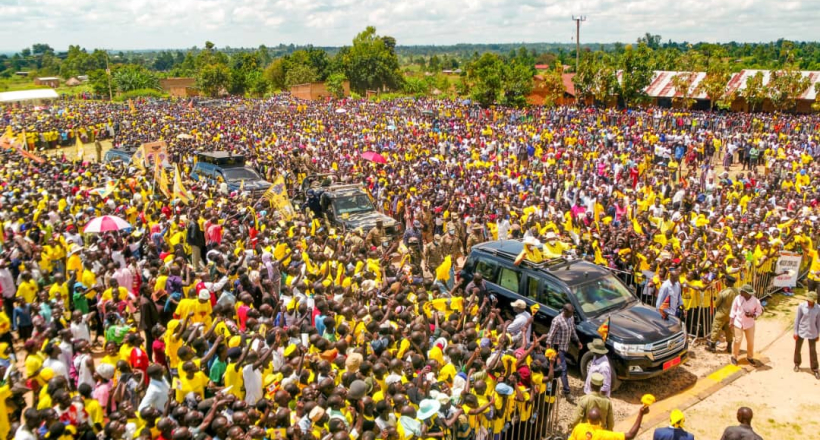
President Yoweri Kaguta Museveni has issued a stern warning against the misuse of government funds, particularly those under the Parish Development Model (PDM) and the skilling hubs initiative, during his campaign rally in Maracha District.
Accompanied by First Lady Janet Museveni, the President urged residents to come forward with information regarding any irregularities in the disbursement of PDM funds, promising immediate follow-up and investigation.
“Anybody who has got information about getting less money on PDM, come and give your contact, your phone number to this armed officer here,” Museveni said while pointing at one of his personal assistants.
“They are going to follow up and catch those who stole the money.”
Museveni’s concerns arose from a question he posed to the crowd, asking whether those who received PDM funds had received more than Shs1m. Almost half of the crowd put up their hands in acceptance.
Maracha District, with 91 parishes, has cumulatively received Shs 27.95b. Out of this, Shs27.576b (98.66%) has been disbursed to 30,695 beneficiary households.
Earlier, Museveni had grilled the Deputy Resident District Commissioner, Monica Koliba, over the whereabouts of the Shs50m he disbursed to the account of the district graduates from the Presidential Skilling Hub in West Nile.
The President immediately directed the party Vice Chairperson for Northern Region, Denis Hamson Obua to find out the whereabouts of the money.
Later, Obua reported that the money was still intact in a bank account at Post Bank Arua Branch.
Museveni expressed dissatisfaction with local government leaders, accusing them of failing to inform beneficiaries about government programs and acting as though the government is separate from the people it serves.
He said such disconnection fosters corruption and hampers effective service delivery. “Our leaders aren’t doing their job the right way.
Why aren’t they informing the beneficiaries?” he questioned. The President reaffirmed his position that government programs are meant to uplift the people, not benefit officials.
On education, Museveni emphasized the need to restore free learning in government schools by removing unnecessary financial burdens like feeding and boarding from the education system. He proposed a return to the original structure of providing one primary school per parish and one secondary school per sub-county, where learners attend school during the day and return home.
“In the next government, I want to reach an agreement with headteachers, PTAs, and foundation bodies to launch free education in government schools across Uganda,” he said.
He acknowledged that 34 out of 91 parishes in Maracha still lack government primary schools and promised to address the gap.
The President also stressed the need for citizens to distinguish between public infrastructure and personal wealth. He pointed out that while the government may build roads, if families remain in poverty, the real development hasn’t been achieved.
“You don’t sleep on the tarmac road,” he said. “You sleep in your houses. If poverty is still in your house, it will be waiting for you when you return.”
He explained that development is a shared asset, while wealth is personal and must be actively pursued through productive economic activity.
Highlighting the importance of agriculture and modern farming techniques.
On infrastructure, Museveni outlined ongoing and planned projects in West Nile. These include roads from Karuma to Koboko, Moyo to Yumbe and Koboko, Nebbi to Paidha, and Panyimur to Pakwach. He also confirmed the extension of high-voltage 132KV electricity from Karuma to meet increasing power demands caused by economic activity in the region and neighbouring South Sudan and DR Congo.
He reaffirmed that these developments are guided by long-term plans, not short-term popularity.
On a broader level, the President used his speech to advocate for patriotism and pan-Africanism. He reminded Ugandans that despite their tribal identities—whether Lugbara, Alur, or Madi—they are first and foremost Ugandans. He stressed that Uganda is a common market that benefits all its citizens, and even those in West Nile benefit from the country’s unity and stability.
He cautioned against shallow political rhetoric and emphasized that leadership must be grounded in purpose and diagnosis of national challenges.

